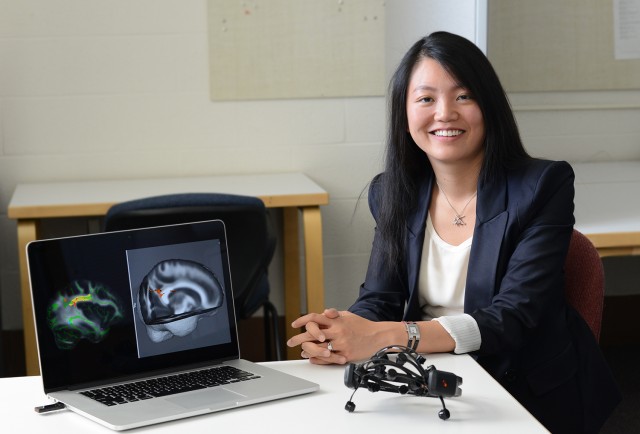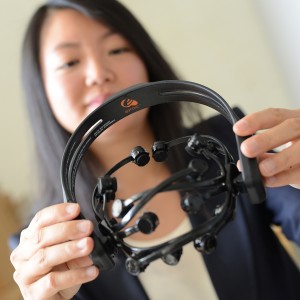Assistant Professor Loui Studies Music Perception, Cognition

In this edition of The Wesleyan Connection, we speak to Psyche Loui, a new assistant professor of psychology, assistant professor of neuroscience and behavior.
Q: Professor Loui, welcome to Wesleyan! Please tell us about your life up to now. Where did you grow up and go to school?
A: I’m from Hong Kong, originally. When I was 13, I moved to Vancouver, Canada, so I’m Canadian. But I just got a Green Card, which is exciting. I went to Duke as an undergrad, where I was a psychology and music double major and earned a neuroscience certificate. Then I went to grad school in psychology at the University of California at Berkeley. I was jointly advised by faculty in psychology and neuroscience and in music. My main interest is music perception and cognition.
Before coming to Wesleyan, I was a post-doc and then an instructor at the Beth Israel Deaconess Medical Center, which is one of the teaching hospitals of Harvard Medical School. My post was in the Department of Neurology—which is a little bit different than my psychology/ neuroscience background—but my lab focused on music and the brain, so that fit really well with my interests.
Q: What brought you to Wesleyan?
A: After a few years of being at a big med school, it’s easy to be kind of jaded and feel like the science is dependent on grant funding, connections and politics. It’s been very nice coming here and feeling like there’s still the energy of being creative and asking good questions, and the integrity. That’s what struck me. And the people were really so nice.
I applied very selectively within the northeast area. I wasn’t really in a rush to leave the Harvard situation. Among the interviews I had, Wesleyan definitely stood out as the nicest place to be.
Q: What classes are you teaching this year?
A: I’m teaching “Cognitive Neuroscience” this semester, which is the study of how the brain enables the mind. We spent the first third of the class studying the physics behind it—How does fMRI work? How does EEG work? We spent the second portion studying sensory and motor and cognitive functions—how does vision work? How does audition work? How does learning happen in the brain? The last section will cover longer-term topics, like development and evolution, and also exciting new developments in social cognition and affective science.
In the spring, I’m hopefully going to teach a Music Perception and Cognition seminar, which is right up my alley. I’m also going to teach “Advanced Research Methods in Auditory Cognitive Neuroscience,” which will be a small laboratory course.

Q: What has been your impression of your students so far?
A: They’re really smart, really brilliant. I think there’s a lot of intellectual curiosity—I’m getting really good questions in my classes—and there’s a lot of drive to learn, which is so exciting. I’ve noticed some things are different here than what I’m used to coming from a larger university background, where there’s no handholding; you have to swim or else you’ll be sinking. The ones who do very well at Berkeley have to be resourceful. They may be less intellectually curious, but more practical, like knowing what to study for. I feel like at Wesleyan, students have been more generally curious and interested and creative, but maybe expect a little bit more handholding. There’s a lot of really good writing that I see, both in tests and papers. It’s been so personal, and that’s really nice and very different than the larger university model.
Q: You’ve been focused on music and the brain for quite some time. How did this interest first develop?
A: I’ve played violin and piano since I was quite little. I was going to be pre-med, but then in college, I started getting really interested in questions about the mind and subjective experience, and how you could use these objective measures to understand them. On the side, I was still playing the violin. After awhile, I had finished all my psych and neuroscience courses and it became very easy to also declare a music major. My junior year, through different class projects I began learning about this field of music and the brain. I found it really fascinating. I proposed a thesis in senior year looking at brain potentials (electrical fluctuations recorded on the surface of the head) while people were listening to music. We looked at how the brain responded to expected and unexpected chord progressions, and how that changed depending on whether you were actually listening to music or just had music on in the background while doing something else. That was a segue into applying for grad school. It caught the interest of the professors in the Psychology Department and the Center for New Music and Audio Technologies at Berkeley.
Q: What is the specific focus of your current research?
A: My long-term lab and office are not set up yet; I plan to get some equipment like EEG to use for experiments, and to get some MRI data from off-campus. But what I can do now are human behavioral experiments. I am just starting to run experiments on music perception and cognition, specifically looking at how individual differences in pitch perception might relate to other abilities. One out of seven people believe they’re tone deaf. What we don’t know is how this affects their other abilities. Does it have consequences for how well you hear the professor in class, or how you pay attention visually to people’s eye, eyebrow or head movements when they speak? If someone is tone deaf, they may struggle to pick up audio cues in another person’s speech, such as a raised pitch at the end of a question. We’re asking whether those people might strategically rely more on visual cues to make sense of another person’s speech. We’re also curious about how tone deafness might affect people who speak tonal languages like Cantonese or Mandarin, which use pitch differences. It appears there are some Cantonese and Mandarin speakers who are tone deaf, but it might be less prevalent in those populations.
I also think it would be really interesting to look into making music directly out of brain potentials. One reason I’m really excited to be at Wesleyan is that Alvin Lucier, who was in the music department here, in the 1960s wrote the piece, “Music for Solo Performer” that mapped his brain potentials onto musical instruments. That was probably the first use of biofeedback in music. Now we’re getting to a stage where it’s a lot less costly and easier to collect EEG data, allowing for the ability to control music with your brain, without using your hands. That’s really exciting. I have here a portable EEG headset, which looks like a headband with 14 channels of electrodes that go around your scalp. When it’s working well, you can use it to control a mouse or type or play a musical instrument. I recently was able to use it to perform a musical piece on a computer musical instrument.
Q: You still perform on violin and piano. Please tell us about your musical activities.
A: I play in the Longwood Symphony Orchestra, a Boston-area orchestra for the medical community. We use our concerts to support health-related nonprofit organizations through public performances. It’s been really meaningful and I’ve made a lot of friends through it. I also play in a string quartet called Folie à Quatre. We’re all psychologists and psychiatrists. We seem to have specialized so far in composers who have some kind of psychological disorder—there’s a lot of them.

